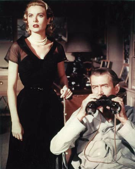The language of the cinema not only pervades the way we view the world around us, but also how we view our own lives. Our experiences are increasingly mediated--to the point that one can imagine their existence as a series of narrative arcs, character types, and tracking shots. As such, it is of the essence that we continually renegotiate and critically assess our relationship to cinema--both as producers and viewers. This coming weekend in Oslo, the Office of Contemporary Art Norway, through the symposium Film as Critical Practice, proposes to do just this. Artists and theorists such as Harun Farocki, Kristin Ross, and Hito Steyerl, will assess and debate what the notion of 'critical' means in contemporary cinema. Laura Mulvey, who in her 1973 essay 'Visual Pleasure and Narrative Cinema' forever altered the field of film studies through her articulation of the male gaze, will unpack how this gaze changes when, enabled by technology, spectators of either gender can pause, fast forward, slow down, and repeat key sequences and frames of a film. A supplemental film program 'Material Critical Poetics' curated by Ian White from the Whitechapel Gallery includes films by Anthony McCall. Peter Gidal and Emily Wardill and will examine, in White's words, 'what constitutes 'critical film' or what 'film as a critical practice' might be, in the context of contemporary visual art and a particular historical legacy.' - Caitlin Jones
